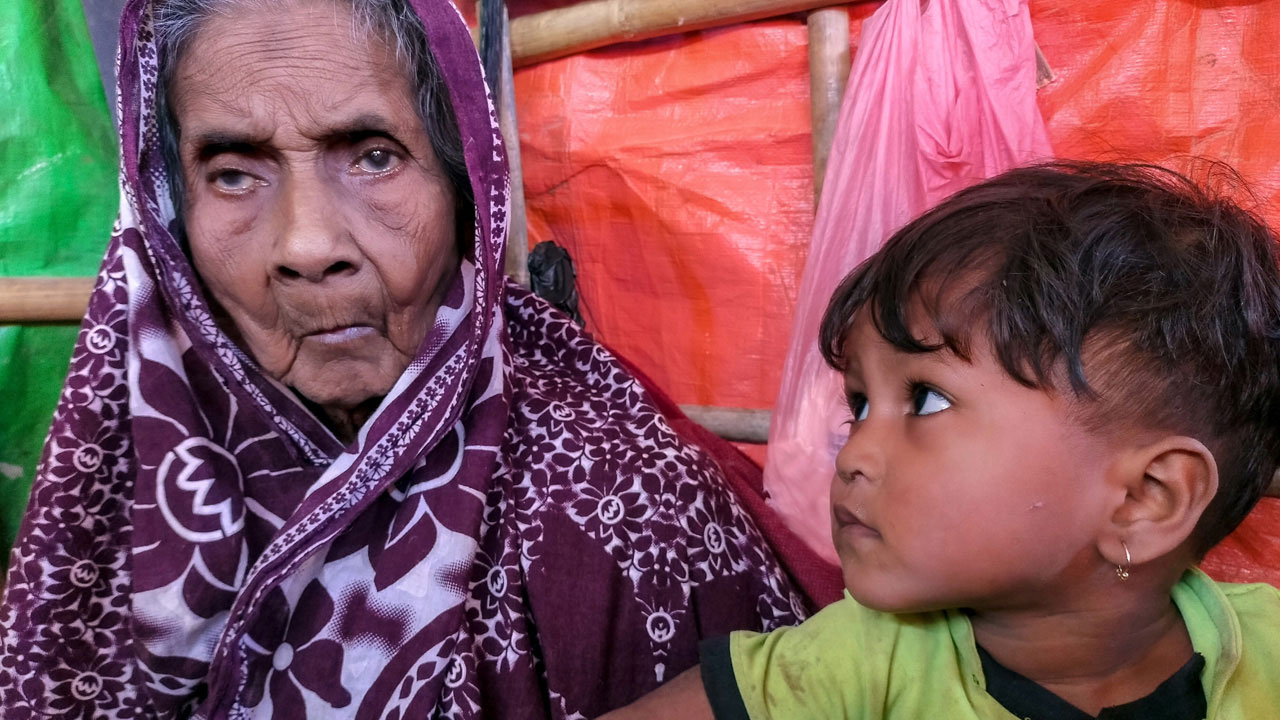
Six Times a Refugee
‘When I die, wash me with this loda.’
- Solima Khatun, 120-years-old
Solima Khatun has held onto her loda, a heavy spouted brass water pot used for cleaning the body, for nearly one century. It is one of her only remaining possessions from her life in Myanmar.
At one hundred and twenty-years, she is now one of the oldest living Rohingya people. She is a human refuge, offering warmth and rootedness for four generations of refugees in her home in Kutupalong.
Solima is six times a refugee: she was displaced from her homeland during the World War II Japanese invasions of 1942 and 1944, and again in 1956, 1978, 1991, and 2017. Sometimes, she hiked hilly terrains; to reach safety in Bangladesh; other times, she waded across rivers. But, the last time, she had to be carried as, at age 117 according to her UNHCR-issued ID card, she was too frail to walk.
‘I carried her on my back all the way here. My mother said she would not abandon her own mother alone in Myanmar,’says Dost Mohammod, Solima Khatun’s thirty-year-old grandson.
STORIES OF THE HOMELAND
Every time Solima fled her homeland, she returned to find her home burnt. She remembers rebuilding her house
‘Mother loved gardening around the house. We used to have fruit trees, like coconuts, guavas, hog plums, etc. We also had roses and other flowers, too,’ says her daughters, Jamalida and Nurujjamal, both nearly centenarians themselves.
Solima was fond of cooking, too. She would make all the Rohingya traditional firas (rice cakes) much to the joy of her husband and children. She lost her husband before the influx of 1978, and her three sons before the turn of the century, but her deep well of memories make her a living embodiment of Rohingya culture. Her two daughters, their children, and her grandchildren would gather around her to hear her stories. Sometimes she loses the track of years, but the feelings remain strong.
‘We never wanted to stay here. Even though they give us food here, we still want to return. For our country, our "fetfure,"’ says her daughters.
Fetfure is a Rohingya expression that is almost untranslatable. Its literal meaning could be, ‘Our stomach burns for our homeland’. ‘Homesick’ does not quite capture the heaviness of the phrase.
MATERIAL MEMORIES
‘We had lands, especially paddy fields, which we leased out or cultivated for income,’ says Nurujjamal with a sigh. Their houses have been burnt, and their lands seized. Very little that is tangible remains of former life — other than Solima’s fitoler loda, her brass water pot.
A loda is used to cleanse oneself with water, when showering or making oju (ritual ablution for prayer), or after nature’s call. Solima’s loda is over one kilogram, which makes it difficult to carry.
‘We love our mother. And our mother loves it. So we had to carry it all through the rough terrain while fleeing,’ says Jamalida, her eldest daughter.
‘It was given to her by her parents as a wedding gift. The only other thing that we have from home is the locket she used to wear,’ says Nurujjamal.
Through her six journeys of displacement, Solima had carried her loda. She has been using it with care, exclusively for ablution before her prayers. The brass pot is heavy with memories. for her, living is resistance, living is upholding cultural memory.
* * *
Written by Fouzia Reza, copywriter and editor of the Rohingya Cultural Memory Centre.
